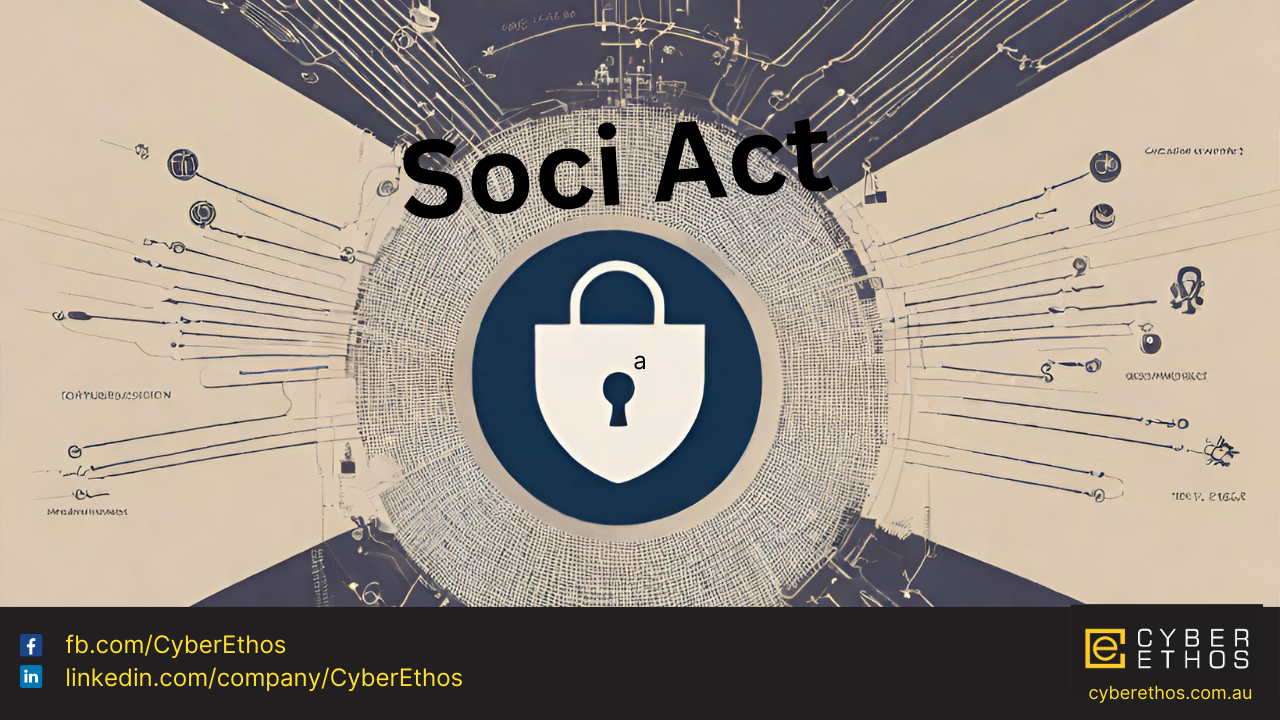What is Soci act?
Understanding the SOCI Act: A Guide to Critical Infrastructure Risk Management in Australia
Australia’s SOCI (Security of Critical Infrastructure) Act explained: One hundred and forty-three (143) cyber security incidents that were reported by businesses that self-identified as critical infrastructure in FY23. Accounts or credentials that had been hacked, assets, networks, or infrastructure that had been compromised, and denial of service (DoS) attacks accounted for nearly 57% of these attacks. Incidents reported by entities who self-identified as critical infrastructure
What is the big deal and what does this imply going forward for businesses in Australia?
Essential services in the areas of utilities, healthcare, education, and military are provided by Australia’s vital infrastructure, which serves as the backbone of our society. Attacks on the internet that disrupt the delivery of services can have repercussions for individuals, our economy, and our national security. As a consequence of this, the Australian government passed the Security of Critical Infrastructure Act 2018 (SOCI Act) as a legislative piece of legislation to strengthen critical infrastructure against threats that are currently occurring and those that will occur in the future.
What is the SOCI Act?
Key Objectives of the SOCI Act
The SOCI Act is a regulatory framework that was created with the intention of protecting Australia’s critical services from the dangers posed by cyberattacks. In the past few years, the Act has been subjected to a number of substantial revisions. The scope of the SOCI Act has been enlarged as a result of these amendments, which were carried out in two parts over the years 2021 and 2022. As a result, Australia now possesses the resources necessary to combat sophisticated cyber threats.
Importance of the SOCI Act in Australia
- Increased government authority: The Government now have more authority to gather information, issue directives, and intervene in serious cyber security incidents: these are all examples of enhanced government authority. The Australian Department of Home Affairs website provides comprehensive information about their powers and the triggers for their intervention.
- Entities are required to report operational information to the Register of Critical Infrastructure Assets, which ensures greater transparency and preparation. This is one of the Positive Security Obligation .There is a mandatory obligation for companies to report cyber incidents within predetermined times, which supports timely and coordinated response activities. This requirement is in place to ensure that cyber incidents are reported quickly.
- Infrastructure Risk Management Programs: The Act requires comprehensive risk management programmes that take a risk-based approach, addressing natural, artificial, and cyber-related threats to asset security. These critical infrastructure risk management programmes must be implemented in accordance with the Act.
Activities that must be completed in order to be in conformity with the SOCI Act
Organisations are required to engage in strategic actions that aim to improve their operational integrity and security in order to fulfill the criteria of the SOCI Act. Among the most important activities are the following:
- At regular intervals, risk assessments are conducted in order to identify potential security threats and vulnerabilities that have the potential to compromise the integrity and performance of critical infrastructure. Entities are able to employ mitigation methods in order to ensure that infrastructure continues to be secure and operational if they maintain a consistent risk assessment process.
- Protecting vital infrastructure from cyber-attacks and digital espionage requires the implementation of robust cyber security measures. The cyber security measures that are put into place should include preventative controls as well as a response strategy if an attack takes place. This will allow companies to react swiftly and reduce the damage of the attack.
- In order to guarantee that organizations operate with integrity and swiftly identify and handle any risks, it is imperative that there is transparent communication regarding the operational control of assets.
Compliance with the SOCI Act
Reporting critical occurrences that potentially influence security. The Security of Critical Infrastructure Act requires organisations that are responsible for critical infrastructure to notify regulatory agencies in a timely manner of any possible threats or major incidents. This ensures that regulatory bodies are able to support you if an incident occurs that impacts your critical infrastructure asset.
As I close, there are stringent requirements that are outlined in the SOCI Act that are designed to strengthen Australia’s critical infrastructure against cyber security threats. It is impossible for Australia to function without its vital infrastructure, and the purpose of the SOCI Act is to ensure that these organisations are appropriately equipped to deal with any security threats that may arise. This ensures that each responsible entity is fully prepared to manage and protect our critical infrastructure assets.
To learn more about the Essential 8 and its impact on organizations, feel free to connect with us. Our team is ready to provide you with this solution—just send us a message, and we’ll get in touch. We are among the best cybersecurity companies in Brisbane.
